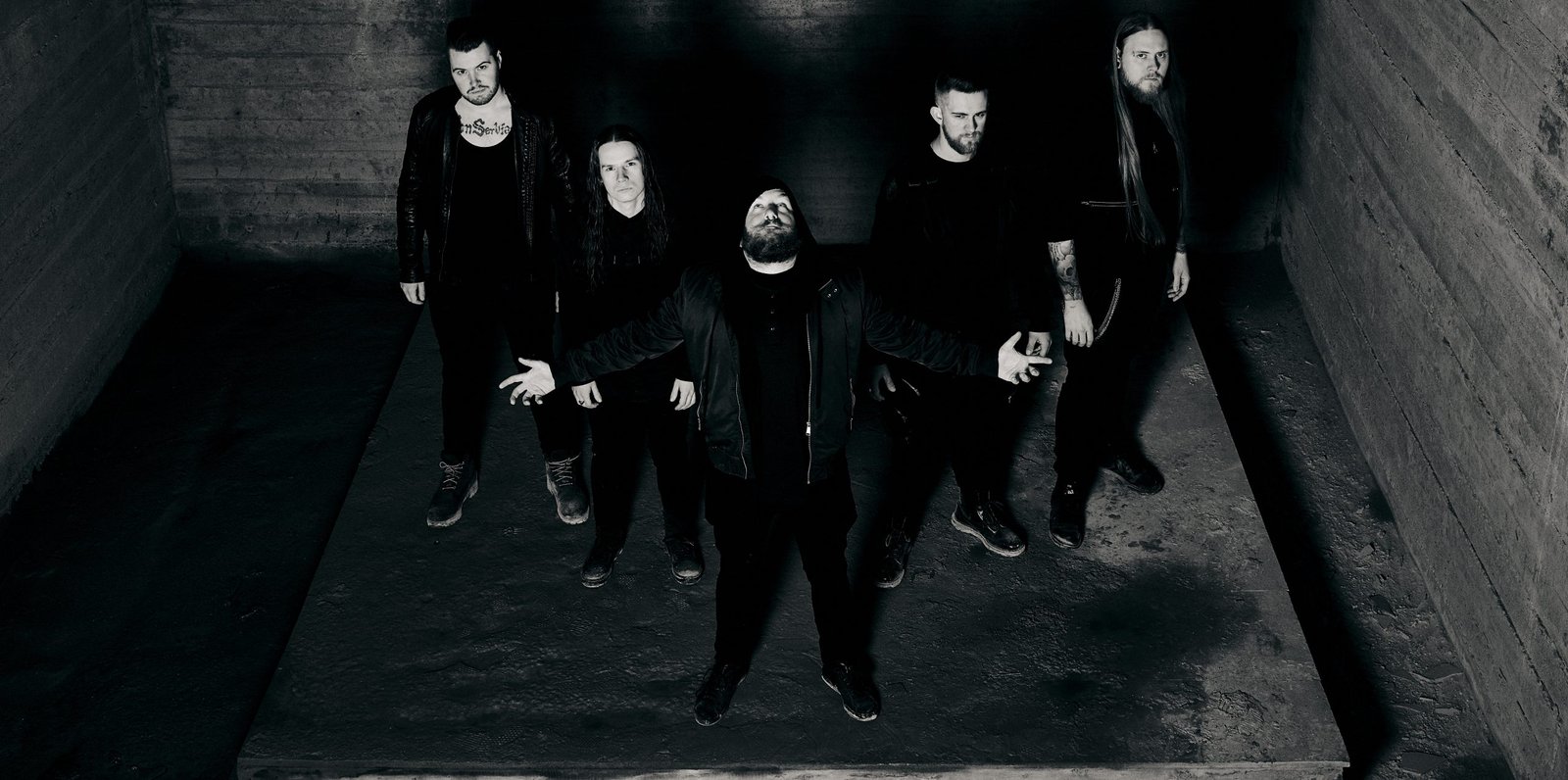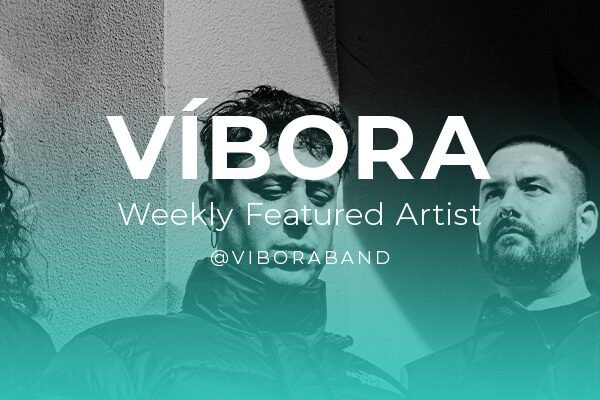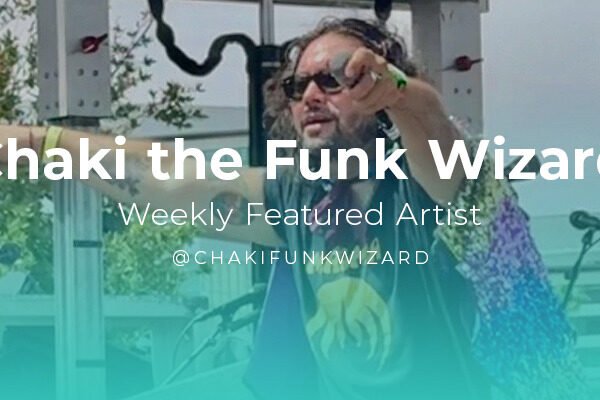Just in case this wasn’t plastered enough over the internet (probably not), I’m also here today to tell you that 2021 is more amazing due to Icelandic sensation Ophidian I. Why? Desolate! What? Desolate is the album they dropped earlier this year and it might as well be one of the crowning jewels on the monstrous monument that technical death metal is. If you want to get a detailed scoop on it, just go ahead and listen to it – it’s fucking glorious. Alternatively, just head to our review of the record, where fellow writer JP and myself talk through its innards. I reached out to the band in hopes of getting a more in-depth view on what’s going on, on their side of things. Below you can see me diving into the core of things with Ophidian I guitarist Daníel Máni Konráðsson.
With such a bombastic entrance, basically out of nowhere, one of the things that was first and foremost on my mind was, ‘where did this whole thing actually come from’? It all began roughly a decade ago when, basically, a bunch of like-minded people decided to lay some sounds down. As Daníel says so himself:
‘Ophidian I was originally formed in 2010 by a few friends who had a shared interest in the technical death metal bands that ruled the day (Spawn of Possession, Necrophagist, Obscura, Psycroptic). Looking back, it was more akin to an excuse for a group of friends to get together and party while playing death metal. While instrumentation was a big deal for us from the start, it wasn’t really actualized at the level we aspired to until the band was reformed a few years later.’
For those of you who already dug around though, it becomes apparent that Desolate isn’t the band’s debut, even if it really feels like it. Way back in 2012, Solvet Saeclum actually saw the light of day as the debut of the initial incarnation of the band. Whoever listens to it, like me, will immediately see that there is a world of difference between then and now, so what gives? It’s like the first form of the band is an entirely different band. Daníel sheds some light on this:
‘The previous iteration of the band does indeed have little to nothing to do with the band that’s here today. Back then, it was more a byproduct of a friendship garnered while playing music, whereas today we have a very specific sound and goal in mind.
A few years after the release of the first album, the band took an hiatus. All members worked on other musical projects and continued to evolve their individual skills while doing so. However, the interest to play technical music never went away, and after some years had passed, the idea was brought up to reform the band: now with a different approach, style, and members.’
So that seems to be the gist of it. Pretty straightforward when compared to the tunes at least, right? Speaking of which, if you’ve listened to the record, you’re as aware as I am that the music is as intricate as it is catchy. It’s also clear that Desolate picks up cues from vastly different areas when contrasted with your usual tech death affairs. I particularly noted in the Desolate review that there’s a heavy usage of mixolydian and dorian as opposed to the phrygian that’s ever-present in tech-death. I also picked up on something of a classical influence, where entire note selections are covered in one massive arpeggio, reminiscent of one of Chopin‘s trademarks. Daníel further elaborates on this particular point:
‘Desolate definitely makes use of our influences from various different strains of music. Being able to take inspiration from all over the musical spectrum and directly apply those concepts to our music was a very conscious effort. For myself, this was one of the more liberating things I’ve done musically. Tearing down the invisible walls of sounds that you generally associate with tech-death and working with more sounds and chord/scale combinations was super fun, and really felt like paving some new ground.
Going into the reformation of the band a few years ago and getting into writing the album, we wanted to rely on hooks and traditional songwriting methods above all else. As we generally started out with a guitar hook or chord structure, we worked our way from there and kept our ears to what we’d want to be the focal part of the song from the start. This process sort of made the album more melody-reliant than if we’d gone for a different approach. Having that melodic centerpiece to guide the song and lure the listener in and out of the hook just brought the songs leaps and bounds further sonically.
There are absolutely some classical influences here and there across the record: for example, in “Storm Aglow”, where we deliberately sought inspiration to further solidify that particular sound in a particular section. Other than opting for it explicitly at a few points, I can’t say that classical methodology was on the top of our minds. We were more looking towards how the song it would sound if it’d exist in a parallel universe where tech-death was the pop music that’s played on the radio. That was basically the sound in our heads and the goal we wanted to achieve.’
Alright, we have a pretty clear-cut idea of how it all goes down, but where does it all come from? What would be the focal points where the drive flows from? It seems that the main point of inspiration lies in a very similar territory as its output:
‘The fundamental and collective influences for the band are still tech-death bands such as Necrophagist, (…), and Archspire. Although the sound is manipulated in other directions as we apply more and more influences, the essence is still very tech-death in nature.
While arranging and recording the guitars for the album, I was listening a lot to jazz guitarists like Julian Lage and Bill Frisell. Their approach to the instrument is very appealing to me and has a sound and feel I very much connect with. While writing many of the songs, I was also listening to a lot of female pop artists such as Sigrid, MØ, Joni Mitchell, Sia, and Phoebe Bridgers. The melodies and quality of the songs coming from them are just on another level in my opinion.
There may be some unconscious elements that have crept in from movies or books, but I can’t say for sure. That being said, Moby Dick is a piece of literature that almost always gets on my mind at some point while writing lyrics. The mood that is set in that book is so strong and vivid that it almost feels like something real to look back on.’
Speaking of Archspire in particular, it seems that the initial reception of the album was met with a lot of parallels between the two bands. I concur with most of these remarks, although these are definitely two vastly different things when putting them next to each other. Daníel also agrees, but in more detail:
‘Naturally, there are similarities as both bands operate within the same subgenre of death metal, and they’ve definitely been an inspiration to us. I can understand drawing parallels between the two, as they also do really fast stuff and oftentimes keep their songs quite concise as well.
That being said, I think the two bands still sound drastically different. They’ve got their set of characteristics within their songwriting they tend to reach for, and we’ve got ours.’
Naturally, the other thing that comes to mind in regards to the band’s music is: how does it physically come to be? The actual process sounds maybe a little more organic than how I envisioned it initially, based solely on what I heard on the album. It’s also a process which doesn’t seem to be particularly unusual or wild (not that it’s a bad thing in any way):
‘For most of the songs, we started with either a chord combination or a particular hook that we’d then construct a song around. We’d generally make a fully formed demo using programmed drums and then head into the rehearsal space to feel it out. There, we’d rehearse the song and make adjustments here and there. After doing so, we’d go back to the studio and make a revised demo including those changes. We would usually go about this process a few times over for each song before settling a 100% on a song. This process worked well for us, as we could keep everything concise and not spend too much time on practical things such as teaching each other sections at rehearsal or mouthing out and explaining drum beats. Each member would rehearse their part at home, and at rehearsal we would make alterations as we’d see fit and focus on the song itself at all times during the process.’
With all of this in mind, we can only speculate about what’s happening throughout the concept of the album at a lyrical level. Especially since the lyrics aren’t easily deciphered from their delivery, and when reaching for a close inspection of them, they turn out to be in something of a contrast to the sounds around them. They’re fairly dark, bleak, and rather vague, none of which is in any way unusual for this style of music. Although, a unifying concept that would tie them still eludes me. So, Daníel clarifies things:
‘The lyrical themes on the album are of personal nature for the most part. Matters of the heart that are conveyed through the use of allegories. Many of them are set amongst the harsher parts of a world, much like the one we hail from (Iceland), as explorations through those inhabitable places serve as testimony to the cruelty of ourselves and the world we are all part of. The trials and hardships that come with maneuvering across those lands have much in common with the experiences we dive into in the lyrics on this album.’
This also begs the question of whether the band’s name ties in with any of the above. There doesn’t seem to be any grand puzzle or deeper meaning. It’s just something that works:
‘The band name was initially the name of a song we were working on. We felt the name had a good ring to it, and after quick consideration, we settled on it as the name of the band instead. There’s not really a careful meaning behind it. At the time, we were working on a lyric about a being resembling a reptilian creature, and it referring to itself could maybe sound something like ‘Ophidian I’.’
I don’t know about you, but I do not want Desolate to be the only instance of this type of metal. It’s just too good to go out with one show and a bang. Rest assured, we’ll be definitely hearing more of this in the future as Daníel confirms:
‘We will probably continue to explore this avenue of ours further: go deeper into the sound we’ve crafted and try to create even more memorable songs, while still employing all the fast and extreme stuff we all love. I think we may try to keep the songs a bit more concise and perhaps shorter as well, but we’ll see. We are just starting to contemplate where to go from here.’
Something I wonder about, when faced with virtually any album, is what goes beyond the processes of creation and drive. Particularly the more unpalpable aspects, past the need to voice ideas, in the realm of personal achievement at a higher level. For the purposes of our discussion, I’d say it seems that for a fair amount of bands, especially in the metal segment, it tends to converge around catharsis in some form or another:
‘It’s a certain type of catharsis, I guess. We’ve tried to explore a sound that we’ve collectively found in our heads, and done our best to bring it out into physical form. Doing so definitely brings with it a sense of relief or unloading, so that cathartic feeling is certainly a drive to keep writing and recording.’
Finally, with the rather fucked-up state of the world in a general sense – what with the pandemic and its twisted ramifications – the world of art, in particular the realm of touring musicians, has seen a lot of mishaps and setbacks. Ophidian I are no strangers to the situation and, like many other artists, they are pulling through to the best of their ability and resources:
‘Due to where things were heading, we did decide to hold off on the release of the album for a while. After some time had passed and we could see that things weren’t going to change anytime soon, we decided it’d be better to release the album regardless of the current global state. We’ve been really humbled by the reach and performance of the album so far, so we are very happy with how it came out – all things considered.
Once the world starts resembling some variant of normal again, we of course hope to get out there and tour. Bringing the album in a live format is the ultimate experience for all parties, and hopefully we’ll be able to do so before long.
Until then, we continue to work on more digital content, as well as writing more songs. There is plenty for us to keep our minds busy with, regardless of the situation that plagues us all for the time being.’
So there you have it, a neat little dissection of what is surely the hottest thing in technical death metal at the current moment. Ophidian I relentlessly pummel through everything with tunes that are as catchy as they are heavy, offering an unusually great relistenability value while they’re at it. Don’t forget to follow the band on Facebook and/or Bandcamp!






